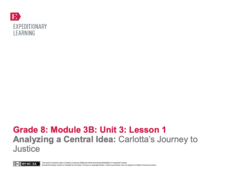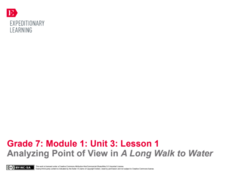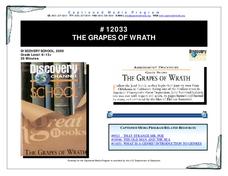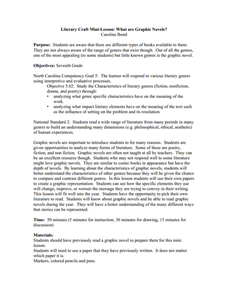EngageNY
Analyzing Word Choice: Understanding Working Conditions in the Mills
Ravenous or hungry, happy or ecstatic—why does word choice matter? Scholars continue to analyze working conditions in the mill and how the conditions affect the protagonist of Katherine Paterson's novel, Lyddie. They engage in a close...
EngageNY
Analyzing the Significance of the Novel’s Title: Connecting the Universal Refugee Experience to Inside Out and Back Again
How might different authors approach the same topic? Scholars read a paragraph from an informational text about Canadian refugees using the resource. Next, they participate in a jigsaw activity to connect real-life refugees' experiences...
EngageNY
Introducing Final Performance Task and Analyzing Statistics
How do statistics help people understand the universal refugee experience? Using the resource, scholars engage in an activity called a Chalk Talk, working in teams to analyze statistics from informational texts about refugees. Also, they...
EngageNY
Analyzing a Central Idea: Carlotta’s Journey to Justice
Verbs are deceptive and like to disguise themselves. Young linguists identify verbals, specifically gerunds, infinitives, and participles when analyzing the third stage of Carlotta's journey in the novel A Mighty Long Way. Bridge...
EngageNY
Analyzing Point of View in A Long Walk to Water
Readers analyze how characters are juxtaposed in Linda Sue Park's novel A Long Walk to Water and discuss their ideas with the class. Then, with a partner, they complete a juxtaposition practice worksheet.
EngageNY
Analyzing Point of View and Figurative Language: Chapter 1
Check out the view! Scholars complete a graphic organizer to analyze how Laurence Yep develops a character's point of view in Dragonwings. Additionally, pupils re-read parts of the novel and annotate the text on sticky notes, looking for...
EngageNY
Analyzing Point of View and Figurative Language: Chapter 3
Get to the point ... the point of view, that is! Pupils analyze Laurence Yep's Dragonwings for tone, figurative language, and point of view by completing graphic organizers. Scholars also read an excerpt from the novel and record the...
EngageNY
Mid-Unit Assessment: Analyzing Visual Elements in a Graphic Novel
Can I get a visual? Scholars work on their mid-unit assessments by analyzing vocabulary and discussing visual elements in Investigating the Scientific Method with Max
Axiom Super Scientist. They then reflect on their learning by...
Curated OER
Creating a Science Fiction Story
As the culminating activity in a unit study of science fiction, young writers demonstrate their understanding of the genre by producing their own graphic novel. After deciding on the main elements of their story, individuals use a comic...
Curated OER
Dragonwings: Evaluate Chapters 10-12
As your class finishes the novel Dragonwings, use these culminating projects. A vocabulary list is given for chapters eleven and twelve and either an epitaph or letter activity concludes the book. The final project consists of creating a...
Curated OER
Satire and The Adventures of Huckleberry Finn
Does Mark Twain’s satire become sarcasm and does he cross the line of propriety in The Adventures of Huckleberry Finn? As an introduction of satire, class members view an excerpt from The Daily Show and discuss Stewart's use of this...
Captioned Media
Creating Dramatic Monologues from The Grapes of Wrath
Set in Oklahoma in the 1930s, The Grapes of Wrath presents a powerful view of life during the Great Depression. An insightful lesson plan takes a closer look at the characters in John Steinbeck's classic novel, combining the descriptions...
EngageNY
Close Reading to Learn about Lyddie’s Character
Scholars work in pairs to analyze the characters, plot, and setting of Katherine Paterson's novel, Lyddie. Next, they apply what they learned about the characters' feelings and motivation to perform a mini reader's theater.
K20 LEARN
Lord of the Flies Unit, Lesson 1: I'm A Survivor
What three readily available things would you grab in case of an emergency? That's the question that launches a unit study of William Golding's The Lord of the Flies. After sharing their choices, class members read Golding's rationale...
Appalachian State University
What Are Graphic Novels?
To do this engaging and pleasurable activity, your learners should have already read a graphic novel, and produced a piece of writing that can be reproduced into the format of a graphic novel. This exercise provides a script that...
Curated OER
Analyzing Literature via Literature Circles
Introduce literature circles with Roland Smith's novels. Your seventh graders will see the activity modeled as you read The Three Little Pigs together and apply the format to a Roland Smith novel of their choice. The lesson includes...
Curated OER
The True Confessions of Charlotte Doyle: Graphic Organizer
After completing the first five chapters of The True Confessions of Charlotte Doyle By Avi, use direct quotes to make inferences about how Charlotte feels about certain characters. Later, when the novel has concluded, revisit the text to...
Curated OER
The Lightning Thief: Questioning Strategy
Step into the shoes of the Oracle from the novel, Percy Jackson and the Olympians: The Lightning Thief by Rick Riordan, with this response to reading activity. After reading chapter nine, scholars answer questions from the Oracle's point...
University of Virginia
Analyzing Social Commentary in The Adventures of Huckleberry Finn
The Adventures of Huckleberry Finn continues to be one of the most frequently banned books. The satire and social commentary present challenges when using the book as a core text. Direct readers' attention to how Twain uses plot,...
CPALMS
Analyzing Vonnegut's View of the Future and His Commentary on the Present in Harrison Bergeron
Kurt Vonnegut's short story "Harrison Bergeron" engages adolescents with its theme about the dangers of complete societal equality. Learners complete a graphic organizer to track literary elements in the story, as well as an inference...
EngageNY
Practicing Structures for Reading: Gathering and Using Evidence to Analyze Salva’s and Nya’s Points of View (Chapter 4)
Class members discuss the gist of chapter four of A Long Walk to Water by Linda Sue Park with a partner and share their responses with the class. Next, they complete graphic organizers to answer text-dependent questions based on a close...
EngageNY
Mid-Unit Assessment: Gathering and Using Evidence to Analyze Points of View in A Long Walk to Water (Chapter 5)
Class members discuss how culture, place, and time influence a character's identity in A Long Walk to Water by Linda Sue Park. Then, as part of a mid-unit assessment, they complete a Gathering Evidence graphic organizer to answer the...
EngageNY
Inferring about Character: Analyzing and Discussing Points of View (Chapter 2)
Welcome to the World Café! Readers discuss A Long Walk to Water by Linda Sue Park. They circulate throughout the classroom, stopping at different tables to answer a discussion prompt with their classmates and record their ideas on a chart.
Curated OER
Out of the Dust: Narrative Essay
To conclude their study of Out of the Dust, the 1998 Newbery Medal winning verse novel, individuals craft a narrative essay based on one of the themes in Karen Hesse's novel.

























